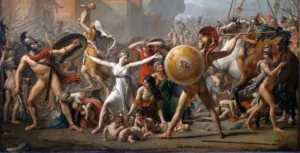A recent Pat Buchanan column blaming America for Syria’s civil war brought back memories.
As a teenager in the late 1970s and early 1980s I went home from school every afternoon to hear Buchanan debate Tom Braden for two hours on radio. Buchanan was the pugnacious conservative commentator who had been a presidential speechwriter for Richard Nixon, for whom he remains a passionate defender. Braden was a liberal commentator, friend to the Kennedys, and author of his memoir of a large family that became the television series Eight Is Enough.
Buchanan was younger, polemically tougher, and a more agile debater against the sometimes confused sounding Braden. During those troubled and often terrifying years, when the world seemed unhinged, and the Soviet Union appeared to be prevailing in the Cold War against an enfeebled America, Buchanan argued for a renewed and assertive foreign policy in defense of Western democracy. His models of Western statesmanship whom he cited were Ike, Churchill, DeGaulle, Adenauer. Later he joined the Reagan White House. As a college intern at that point I encountered him once in that capacity, and later I met him in 1992 at a fundraiser.
His international worldview had deeply influenced me, but my agreement with him by 1992 was decreasing. In 1990 Buchanan had strongly denounced the USA role in the Persian Gulf War that liberated Kuwait from Saddam Hussein’s occupation. He had controversially, as a panelist on the McLaughlin Group (I was watching!), blamed the war drums on the Israeli Defense Ministry and its “amen corner” in America. This comment, and others fueled charges of antisemitism, including a long critique by William Buckley.
In 1990 Buchanan wrote a stirring and misbegotten essay in National Interest called “America First – and Second and Third,” which I recall reading at the time, just months before Iraq’s invasion, in which he outlined his shift away from Cold War internationalism to neo-isolationism. He echoed the pre-WWII rhetoric of Charles Lindbergh and Father Coughlin.
This perspective was disturbingly solidified in his 2009 book Churchill, Hitler, and “The Unnecessary War”: How Britain Lost Its Empire and the West Lost the World. Buchanan resuscitated old canards about how Britain tricked America into WWI and WWII. The Third Reich would not have been so genocidal or aggressive had the Anglo-Americans left it unmolested. Oddly, Buchanan supported extravagant and decades long USA exertions against Soviet communism but not against Hitlerism.
Buchanan has published a new book on Nixon’s “White House Wars” in which he defends his former patron’s Watergate conduct, as he always has. But he does not find Nixon’s deeply committed internationalism, which preceded and post dated the Cold War, at all instructive.
Last week’s Buchanan essay “Are America’s Wars Just and Moral?,” in typical fashion blames America for Syria’s civil war among many other conflicts. He does not mention that Assad repressed and brutalized his country until there were open protests against him, which the dictator characteristically suppressed ineptly and bloodily, provoking an inevitably widespread armed revolt killing tens and then hundreds of thousands. Because for part of that war America has backed a relatively small faction, Buchanan faults his country for many if not most of nearly a half million dead.
“And we wonder why they hate us,” Buchanan exclaims, blaming America for wars across much of the world, which apparently, in America’s absence, would be tranquil. His blame America first refrain of the last 25 years recalls, ironically, the famous San Diego 1984 GOP convention speech of UN Ambassador Jeane Kirkpatrick. Reciting the international political left’s response to nearly every crisis of the previous four years, she repeatedly observed: “They always blame America first.” No doubt Buchanan heartily approved her critique then. But does he realize now he has become what his former colleague condemned?
Although Buchanan commonly derides internationalists as the dreamers who disregard the supposedly sensible neo-isolationist realism he espouses, he advocates an almost Utopian perspective. If America stays at home, the world will do better, and America will be safer. His thesis for today is as realistic as his historical revisionist imagination about a benign Hitler 80 years ago.
The world is always roiling, thanks to fallen human nature, as Buchanan the observant Catholic well knows. Great powers, whether America today or Britain in the 1930s, cannot indefinitely avoid conflict. Nor can they guarantee peace. They can at best manage the periphery of some conflicts, sometimes deterring larger ones in favor of smaller ones. But global conflict will inevitably seek out even reluctant, hibernating great powers.
Forty and 35 years ago, when I followed him with admiration on the radio, Buchanan identified the Soviet Union as the nearly exclusive cause of world conflict. Today he puts America in this role. But no one nation embodies or merits responsibility for what is intrinsic to humanity at all times and places.







 Live in the DC area? Sign-up for Providence's in-person events list!
Live in the DC area? Sign-up for Providence's in-person events list!